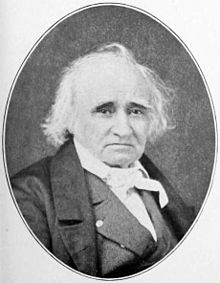Henry Marie Brackenridge
This article includes a list of references, related reading, or external links, but its sources remain unclear because it lacks inline citations. (January 2011) |
Henry Marie Brackenridge | |
|---|---|
 | |
| Member of the U.S. House of Representatives from Pennsylvania's 22nd district | |
| In office October 13, 1840 – March 3, 1841 | |
| Preceded by | Richard Biddle |
| Succeeded by | William W. Irwin |
| Personal details | |
| Born | 1786 Pittsburgh, Pennsylvania |
| Died | 1871 (aged 84-85) |
| Political party | Whig |
Henry Marie Brackenridge (1786–1871) was an American writer, lawyer, judge, and Congressman from Pennsylvania.
He was born the son of the writer and judge Hugh Henry Brackenridge in Pittsburgh, Pennsylvania on May 11, 1786. Educated by his father and private tutors, he attended a French academy at St. Genevieve, Louisiana (now Missouri). He studied law and was admitted to the Pennsylvania bar in 1806, then practiced in Somerset, Pennsylvania.
He moved to St. Louis, Missouri, where he was a lawyer and journalist. He was appointed deputy attorney general of the Territory of Orleans (Louisiana), and district judge of Louisiana in 1812.
He played an intelligence role during the War of 1812, and in 1814 published a history of the war. In 1817 he was appointed secretary of a mission to South America. Brackenridge in 1821 entered the diplomatic service of General Andrew Jackson, who was the new commissioner of Florida. Through Jackson's influence, he served as U.S. judge for the western district of Florida 1821–32.
Brackenridge returned to Pennsylvania in 1832 and became owner of a large tract of land upon which he founded the town of Tarentum, 22 miles northeast of Pittsburgh on the Allegheny River. The adjacent Allegheny County borough of Brackenridge is named for him.
He was elected as a Whig to the 26th United States Congress to fill the vacancy caused by the resignation of Richard Biddle and served from October 13, 1840, to March 3, 1841. He was an unsuccessful candidate for renomination in 1840.
After politics he pursued literature until his death in Pittsburgh on January 18, 1871. He is buried in Prospect Cemetery, Brackenridge, Pennsylvania.
Brackenridge's published works include Views of Louisiana (1814), part of which was a source for Washington Irving's Astoria, and a pamphlet South America (1817), which puts forth a policy similar to the Monroe Doctrine. Sent to South America to study political conditions, he recounted his experiences in Voyage to South America (1819). His Recollections of Persons and Places in the West (1834) is considered a valuable historical source.[citation needed]
References
- United States Congress. "Henry Marie Brackenridge (id: B000732)". Biographical Directory of the United States Congress.
- Keller, William F. (1956). The Nation’s Advocate: Henry Marie Brackenridge and Young America. Pittsburgh: University of Pittsburgh Press.
- The Political Graveyard
